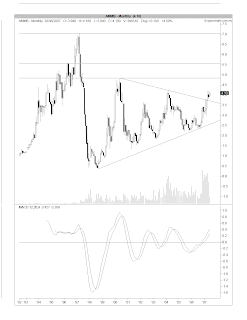On June 13, I have posted a piece on Dow's ongoing correction (go
here). That post was written using Dow's weekly chart. After last Friday's sharp 186-point drop in the Dow, I have re-examined the Dow's chart again; this time I concentrate on the daily chart. The picture that emerged is not good.
From Chart 1 below, we can see that Dow has just broken to the downside of its medium-term uptrend line at the 13380-400 level. The break is fairly marginal & there is possibility of a quick recovery on next Monday.
 Chart 1: DJIA's daily chart as at June 22 (courtesy of Yahoo Finance)
Chart 1: DJIA's daily chart as at June 22 (courtesy of Yahoo Finance)The same outlook also applies to Nasdaq, which has also broken to the downside of its medium-term uptrend line at the 2600 level (see Chart 2 below).
 Chart 2: Nasdaq's daily chart as at June 22 (courtesy of Yahoo Finance)
Chart 2: Nasdaq's daily chart as at June 22 (courtesy of Yahoo Finance)The S&P500's daily chart tells a slightly different story. This index has broken its medium-term in early June & failed to recover despite the recent rebound. A market that has violated its uptrend will go into either a sideway market or a downtrend. For a downtrend to be confirmed, you need to sight a 'lower high and a lower low'. In the case of S&P500 index, a lower high was sighted and, if the current renewed weakness could bring the S&P500 below its early June low of 1485, we would have a lower low. This means that the S&P500 index could be entering a cyclical bearish phase (see Chart 3 below). If this were to happen, it is hard to see how the Dow can escape a similar fate.
 Chart 3: S&P500's daily chart as at June 22 (courtesy of Yahoo Finance)
Chart 3: S&P500's daily chart as at June 22 (courtesy of Yahoo Finance)The on-going correction in the US markets is brought on by the rise in bond yield as well as deteriorating situation in the housing market; both might impact American consumer confidence & spending.
A sharp drop in Dow in the coming week will cause some knee-jerk reaction on this side of the Pacific. So, a better course of action is to stay light on equity for the next week or so. For those who are heavy on stocks, you would have to trim your position & take some losses. A complete sell-off of your equity position may not be necessary at this stage because we do not have any confirmation that Asian markets are about to do a similar correction like the US markets. On the contrary, some Asian markets have broken their recent highs (Hong Kong & Malaysia for example) that are prelude to another bullish rally.


























